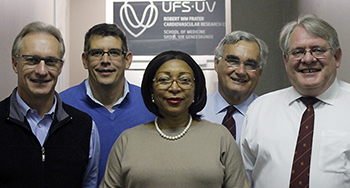Latest News Archive
Please select Category, Year, and then Month to display items
22 September 2021
|
Story Michelle Nöthling
|
Photo Supplied
 Annemarie Le Roux.
Annemarie Le Roux.
“I love working with children.” This is one of the first things Annemarie le Roux mentions when asked to describe herself. This love for children propelled Annemarie into the field of education and she graduated in 2006 with a BEd in Foundation Phase at the UFS. Annemarie immediately immersed herself in the Deaf community, enriching the lives of children at the Thiboloha School for the Deaf in Qwaqwa and the De la Bat School for the Deaf in Worcester.
The academic world enticed Annemarie back to the University of the Free State (UFS) and she was appointed as a junior lecturer in the Department of South African Sign Language (SASL) and Deaf Studies in 2013. Going from strength to strength, Annemarie completed her master’s degree in SASL in 2019, and published an
article earlier this year that she co-wrote with Marga Stander. In this article, they found that SASL “has become an increasingly popular language that hearing university students want to learn as a second language” and subsequently explored different teaching methods used for this emerging group of interested students.
Although now firmly established in academia, Annemarie is still committed to the practical application of SASL. “I am closely involved in student and community engagement through the
SIGNALS Sign Language student association that helps empower the Deaf community and South African Sign Language.” She also interprets for the Deaf community whenever she gets an opportunity, as well as for Deaf students in class and meetings.
On the importance of Sign Language and the recognition of the Deaf community in South Africa, Annemarie believes it will open greater opportunities for development. “More people will be able to learn SASL, and it might even become a subject in school for hearing children.”
UFS cardiac team leading with project
2017-05-31

Prof Peter Schultheiss of the Charité University in Berlin,
Germany, visited the Robert WM Frater Centre for
Cardiovascular Research at the UFS for a study regarding
cardiomyopathy, a significant cause of fatal heart failure
among Africans. From the left are Dr Glen Taylor,
Dr Danie Buys, Prof Makoali Makatoko,
Prof Schultheiss and Prof Francis Smit.
Photo: Rulanzen Martin
A team of cardiac doctors associated with the Robert WM Frater Cardiovascular Research Centre at the University of the Free State’s (UFS) Faculty of Health Sciences has commenced with a pioneering research project regarding idiopathic dilating cardiomyopathy.
An Afrocentric research focus
Prof Francis Smit, Head of the Department of Cardiothoracic Surgery at the UFS and Head of the Frater Centre, describes dilating cardiomyopathy as a heart muscle disease that is quite common, particularly among people of African descent. The disease weakens the heart muscle, which in turn leads to heart failure.
“To date there is no curable treatment for this condition and 50% of patients that have shown heart failure, died within a period of five years. The causes of this condition have been unknown in the majority of patients. But over the past few years major strides have been made where virus infections of the heart muscle or myocarditis have been identified as a possible underlying cause. Various genetic diseases are also linked to it,” says Prof Smit.
International collaborations ensure success
According to Prof Smit, the project is being run in conjunction with Prof Heinz-Peter Schultheiss of the Charité University and the Institute for Cardiac Diagnostics and Therapy in Berlin, Germany.
“We have been working on the project over the past 18 months and I have twice visited Prof Schultheiss in Germany. He is now visiting us in Bloemfontein. We have established a collaborative project focused on patients in central South Africa”.
Prof Schultheiss is a world leader regarding the diagnosis, pathology and treatment of dilating cardiomyopathy, says Prof Smit.
“He brings a lifetime of research experience to Bloemfontein and is internationally renowned as the father of myocardial or heart muscle biopsies.
“His pioneering work on the discipline has led to diagnostic accuracy that has induced purposeful and personalised treatment of dilating cardiomyopathy and has brought about dramatic changes in some subsets of patients’ life expectancy and their cure.”
Solving problems close to home
According to Prof Mokoali Makatoko, Head of the Department of Cardiology, there are more than 1500 new cases of heart failure identified annually at the Universitas Academic Hospital, of which approximately 30% are attributed to cardiomyopathy. “With the use of endomyocardial biopsies the team hopes to treat viruses unique to Southern Africa as well as other underlying causes of dilating cardiomyopathy.”
Prof Stephen Brown, Head of Paediatric Cardiology at the Universitas Academic Hospital, says children suffering from this disease never reach a mature age and those under his supervision will also be undergoing these tests. Various other departments at the UFS will also participate in this project. Profs Makatoko and Brown did the first four endomyocardial biopsies under the management of Prof Schultheiss during the past week. The results will be available in the coming weeks after which the project will be officially launched and patient recruitment will start in earnest.